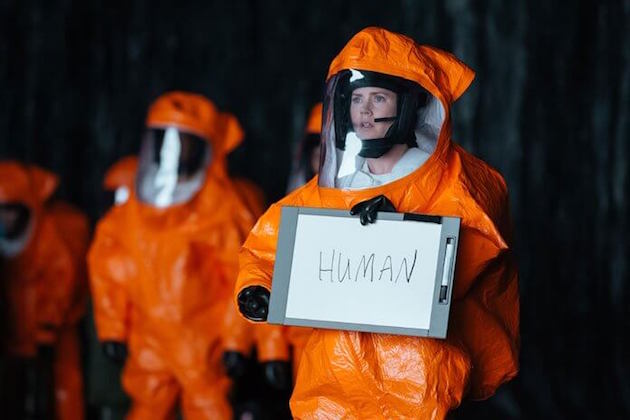“Arrival” is not a film about aliens, but about the problem of human communication.
 The human question is what is the meaning of visiting planet Earth.
The human question is what is the meaning of visiting planet Earth.
Sometimes the thing to watch out for isn’t the film that wins the Oscar, but the film that gets eight nominations, especially when it’s a film that is as uncommercial as “Arrival” by the French-Canadian Director Denis Villeneuve.
Stories about human encounters with aliens tend to ignore the question of how we would communicate with them. That is not the case in this film, in which the main character is a linguist enlisted to decipher the alien language.
The question of the existence of life outside Earth has been approached in a number of different ways. However, even sceptics like astronomer Carl Sagan (1934–1996) – a renown populariser of science and debunker of pseudoscience, whose novel “Contact” was published in 1985 and was taken to the screen by Robert Zemeckis, starring Jodie Foster– show a belief in the possibility of coming into contact with intelligent extra-terrestrial life. This inevitably raises the same theological questions of “2001: A Space Odyssey” (1968). Science-fiction has always had a metaphysical side.
Based on a book by Ted Chiang, the story taken up by the Director of “Incendies” (2001) and “Prisoners” (2013) at first seems to be a parable about the need for communication to resolve the global conflicts facing us. However, both its prologue and its conclusion show us that, in reality, the film is about Time. Past and future become confused, suggesting that they are nothing more than constructions that end up determining our existence. We are creatures of time, whether we like it or not.
LANGUAGE MATTERS
In his film “Interstellar” (2014), Christopher Nolan takes a less sober and more spectacular approach to the question of whether it is possible to transcend the limitations of language. The fourth dimension here is not an “app” for tablets behind a bookshelf; in “Arrival” there are no explosions or dazzling special effects. We find ourselves before the quiet task of interpreting a language.
 The surprise of this non-commercial film is that it got eight Oscar nominations.
The surprise of this non-commercial film is that it got eight Oscar nominations.The mathematician played by Jeremy Renner (Ian) observes that one “hypothesis says that if you immerse yourself in another language, you can rewire your brain”. He is referring to the so-called generative grammar, the school of Noam Chomsky, who has linked language with the global problems of communication found in the world today. What is interesting about “Arrival” is that it takes it to the personal life and intimacy of the main character. In the prologue, the linguistics professor played by Amy Adams (Louise) asks herself whether the beginning will not also be the end of the story, not only the future of our planet, but also that of her own daughter Hannah. The original story by Chiang is in fact called, “The story of your life”.
As we follow this lecturer on her way to her classes, we notice the commotion that surrounds her while she seems to ignore it. Groups of people are huddled around television screens, while military planes fly overhead. When she starts her lecture to the few students that have made it to class, she begins to notice their nervousness as their phones start ringing. Eventually, one of her students asks her to turn on the television. We see her and her students watching the screen, but Villeneuve doesn’t show us what they are seeing. In this way, the spectator finds out what is happening while weighing up the character.
BEGINNING AND END
Despite all the above, we might think that “Arrival” is going to play the hackneyed trick of a final surprise; a twist that makes sense of the story and makes us reinterpret everything in the light of its conclusion. This is however not the case. The flow of time is already broken in the prologue, creating a structural circle, as the ones seen in the alien language that Louise attempts to decipher. The film opens with a montage of images from the life of Louise’s daughter, who suffers from a terminal illness, after which we learn of the disconcerting landing of a series of mysterious giant objects from outer space.
 Amy Adams is a linguist whose aim is to decipher an unknown language.
Amy Adams is a linguist whose aim is to decipher an unknown language.As in the Spielberg classic, “Close encounters of the third kind” (1977), the drama of an individual life is interlinked with the extra-terrestrial enigma. The concept of time is not dismissed, but a new way of seeing it is suggested. That which seems to be in the past becomes part of a future. The question that the humans ask of the aliens is “What is your purpose on Earth?”. Finding out the answer is the task of language, revealing the reality that is out there.
“Arrival” is not a film about aliens, but about the problem of human communication. Some people see these aliens as a parallel to the foreigners who reach Europe and the United States, strange and incomprehensible. However, its revelation gives us the key to understand our lives beyond the constricts of time. It opens the perspective of eternity.
ALONE IN THE UNIVERSE?
Arthur C. Clarke said that “Two possibilities exist: either we are alone in the Universe or we are not. Both are equally terrifying”. The first fear is difficult to capture on screen, although “Gravity” (2013) makes a good attempt at it. The second is much more common in the history of science-fiction. The real question is not whether there is someone out there, but whether any meeting between us is possible. The philosopher Wittgenstein said that if a lion could talk, we would not be able to understand it, raising the question of whether it is possible to communicate with someone who has nothing in common with us.
 The questions is not if there is someone out there, but if this someone has spoken.
The questions is not if there is someone out there, but if this someone has spoken.Biblical revelation shows us a Creator who has spoken “at many times and in various ways” (Hebrews 1:1). The important thing in the Scriptures is not whether we believe that God exists, but whether He has revealed himself and what we are talking about when we talk about God. The god in who you do not believe, is perhaps a god that I don’t believe in either. The issue is not to demonstrate that there is a god, but to determine what god that is, so that we may know him.
If God is a “God who is there” – as Francis Schaeffer entitles his first book–, the next question is whether “He is there and He is not silent” – as he entitles his second book–. That God who is also known as the Eternal, is revealed as a God who is the “beginning and the end, the alpha and the omega” (Apocalypse 22:13). He is the God who “In the past […] spoke to our ancestors through the prophets […] but in these last days […] has spoken to us by his Son” (Hebrews 1:1). He is the ultimate revelation, the final word that existed from the beginning (John 1:1).
The only language capable of saving us is that Word of life, which is the “light of mankind” (John 1:4); an eternal beacon that lights up our darkness (v. 5). It shows us our purpose on Earth, which is to receive the eternal light that has now been manifested (1 John 1:2). Through it, God becomes our Father and we his children when we believe that he is the life (John 1:12). Then, not only the universe, but our own existence acquires meaning.

Las opiniones vertidas por nuestros colaboradores se realizan a nivel personal, pudiendo coincidir o no con la postura de la dirección de Protestante Digital.
Si quieres comentar o